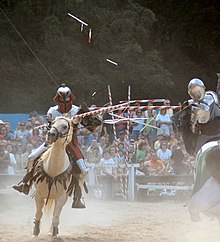joust
English

Etymology
From Middle English, borrowed from Old French jouster (modern French jouter), from Vulgar Latin *juxtō, *iuxtō, *iuxtāre, from Latin iūxta (“close to”). English since the early 14th century.
Pronunciation
- IPA(key): /dʒaʊst/
Audio (US): (file) - Lua error in Module:parameters at line 95: Parameter 1 should be a valid language or etymology language code; the value "Canada" is not valid. See WT:LOL and WT:LOL/E. IPA(key): /dʒʌʊst/
- Rhymes: -aʊst
- Lua error in Module:parameters at line 95: Parameter 1 should be a valid language or etymology language code; the value "also" is not valid. See WT:LOL and WT:LOL/E. IPA(key): /dʒuːst/
- Lua error in Module:parameters at line 95: Parameter 1 should be a valid language or etymology language code; the value "also" is not valid. See WT:LOL and WT:LOL/E. IPA(key): /dʒʌst/
Noun
joust (plural jousts)
- A tilting match: a mock combat between two mounted knights or men-at-arms using lances in the lists or enclosed field.
Synonyms
Translations
a mock combat between two mounted knights or men-at-arms
|
Verb
joust (third-person singular simple present jousts, present participle jousting, simple past and past participle jousted)
- To engage in mock combat on horseback, as two knights in the lists; to tilt.
- To engage in verbal sparring over an important issue. (used of two people, both of whom participate more or less equally)
- (slang) To touch penises while engaging in a sex act, especially oral sex.
Derived terms
Translations
Categories:
- English terms inherited from Middle English
- English terms derived from Middle English
- English terms borrowed from Old French
- English terms derived from Old French
- English terms derived from Vulgar Latin
- English terms derived from Latin
- English 1-syllable words
- English terms with IPA pronunciation
- English terms with audio links
- English 2-syllable words
- Rhymes:English/aʊst
- English terms with homophones
- Rhymes:English/uːst
- Rhymes:English/ʌst
- English lemmas
- English nouns
- English countable nouns
- English verbs
- English slang
- en:Sex
